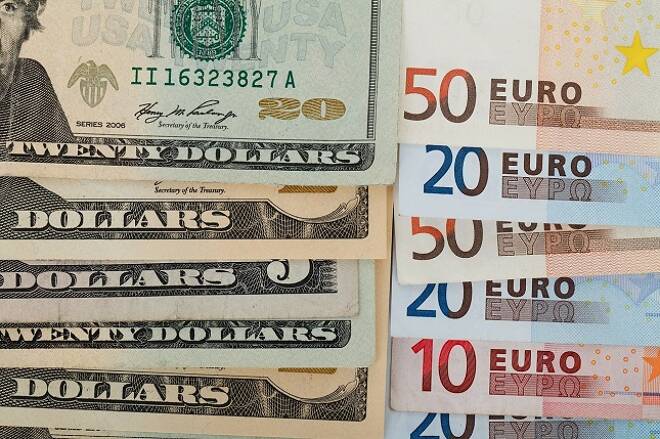Advertisement
Advertisement
The Euro Breaks Through Support but the Exchange Rate is Oversold
By:
The EUR/USD broke down through support as Euro weakness was widespread, rather than dollar strength. Treasury yields edged lower, after breaking out on
The EUR/USD broke down through support as Euro weakness was widespread, rather than dollar strength. Treasury yields edged lower, after breaking out on Tuesday. Tame inflation and concerns over Italian politics weighed on the currency pair.
Technicals
The EUR/USD broke down through trend line support near an upward sloping trend line that is now resistance at 1.1835. Additional resistance is seen near the 10-day moving average at 1.1902. The exchange rate is now oversold with the RSI (relative strength index) printing a reading of 28, below the oversold trigger level of 30 which could foreshadow a correction. The MACD (moving average convergence divergence) histogram made a crossover sell signal which points to a lower exchange rate.
Eurozone April HICP inflation Dipped
Eurozone April HICP inflation was confirmed at 1.2% year over year, down from 1.3% year over year in March. Core inflation also came in unchanged from the preliminary reading at 0.7% year over year, down from 1.0% year over year in March. The breakdown showed the energy price inflation accelerated in April, and services price inflation fell back to 1.0% year over year from 1.5% year over year. The latter is likely due to temporary factors and the earlier timing of Easter this year, which saw holiday related price increases for package holidays in particular, falling back earlier.
German HICP inflation was confirmed in Line with Expectations
German HICP inflation was confirmed at 1.4% year over year as expected in line with the preliminary number and down from 1.5% year over year in the previous month. The national rate stood at 1.6% year over year. The dip in the annual rate was partly due to sharply lower prices for fresh vegetables, which fell -4.5 year over year, prices for package holidays also declined -1.1% year over year, with the latter likely a reflection of the earlier timing of Easter this year, which meant price increases over the holiday period fell out of the equation earlier. Petrol prices picked up in the annual comparison, as did heating out prices and excluding household energy and petrol CPI declined -0.2% month over month.
Italy industrial orders picked up
Italy industrial orders picked up 0.5% month over month in March, after contracting in February. This left the annual rate at 2.6% year over year, just slightly down from the 2.8% year over year in February, but sharply below levels of 9.6% in January and the strong rates seen in Q4 last year. Like in Germany this ongoing weakness casts a shadow over the outlook for the second quarter and adds to concerns that the slowdown in economic activity across the Eurozone in the first quarter of the year is not just due to temporary factors, but the start of a more fundamental shift and waning of growth momentum.
Italian political jitters weigh on bond markets
Italian political jitters weigh on bond markets. Populists apparently on the home stretch to come to an agreement and form a government, which many fear will set Italy on collision course with the EU and the ECB.
The latest quarterly BoE agents report highlighted rising labor costs
The latest quarterly BoE agents report highlighted rising labor costs as a consequence of a tightening labour market. The report is complied from intelligence gathered from the business contacts of the BoE’s 12 regional agents. The responses to the current report came between late February and mid April. The feedback showed a marked slowdown in consumer spending, partly blamed on adverse weather conditions, which had also impacted other sectors, most notably construction and manufacturing. The report also highlighted a continuation of subdued investment intentions, which had continued to be blamed on Brexit-related uncertainties, which was also partly attributed to sluggish corporate demand for credit. On prices, the report found that the effect of past sterling depreciation on imported goods and material costs had been waning but was being partially replaced by global commodity price inflation.
About the Author
David Beckerauthor
David Becker focuses his attention on various consulting and portfolio management activities at Fortuity LLC, where he currently provides oversight for a multimillion-dollar portfolio consisting of commodities, debt, equities, real estate, and more.
Advertisement
